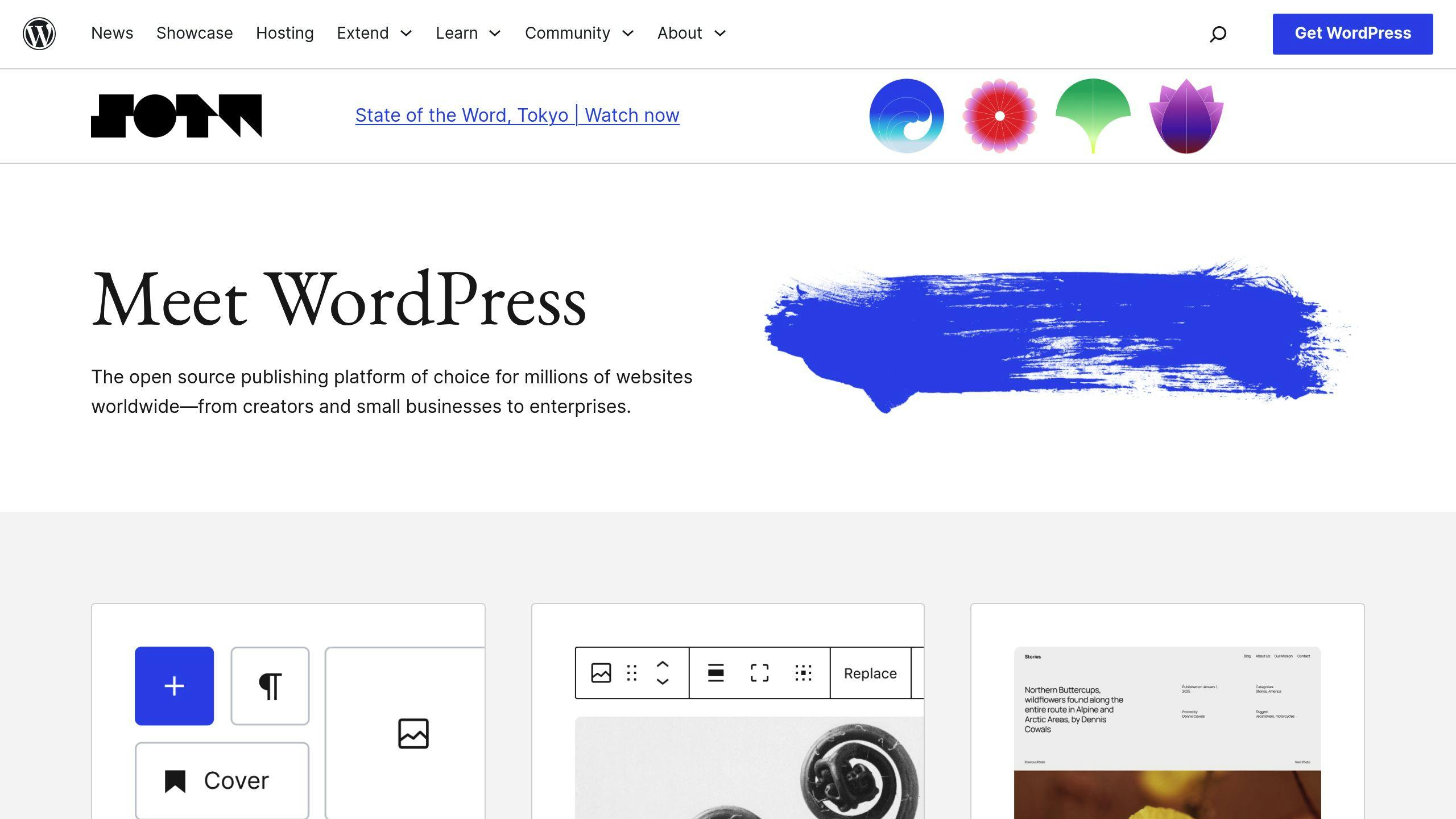Want to boost your WordPress site's performance? A/B testing is your secret weapon. Here's what you need to know:
- A/B testing compares two webpage versions to see which performs better
- You can test headlines, main text, buttons, images, and more
- Small changes can lead to big improvements in engagement and conversions
Quick guide to A/B testing in WordPress:
- Set clear, measurable goals
- Choose the right metrics (e.g., conversion rate, bounce rate)
- Pick a WordPress A/B testing tool (like Google Optimize or Nelio A/B Testing)
- Test one element at a time
- Run tests for at least 1-2 weeks
- Analyze results and implement winners
| Plugin | Best For | Starting Price |
|---|---|---|
| Thrive Optimize | Small businesses | $199/year |
| Nelio A/B Testing | Custom tests | $39/month |
| Google Optimize | Basic free option | Free |
Remember: A/B testing is an ongoing process. Keep testing, learning, and improving your WordPress site.
Related video from YouTube
Types of Content to Test in WordPress

WordPress lets you test different content elements. Here's what you can change and why it matters:
What to Test
You can test these parts of your WordPress site:
| Element | Test Ideas |
|---|---|
| Headlines | Short vs. long, questions vs. statements |
| Main text | Style, length, formatting |
| CTAs | Button color, text, placement |
| Images | Product vs. lifestyle, placement |
| Forms | Number of fields, placement |
| Navigation | Menu structure, item names |
Why Test?
Testing content changes can:
- Get more people to engage
- Turn more visitors into customers
- Make your site easier to use
For example:
Thrive Optimize lets you test landing pages. You could change a button color to see which gets more clicks.
Nelio A/B Testing helps you try different headlines. Make two versions and see which title gets more views.
"A/B testing helps WordPress site owners understand how users behave by comparing different designs, content, or features."
Just remember: Test ONE thing at a time. That way, you'll know exactly what caused any changes in your results.
Getting Ready for Content Tests
Before you start A/B testing on WordPress, you need to prep. Here's how:
Set Clear Goals
Don't just say "make the site better." Be specific:
"Boost email sign-ups by 20% this month."
Your goals should be measurable and tied to business objectives.
Pick the Right Metrics
Choose metrics that match your goals. Here are some common ones:
| Metric | What It Measures | Use It When Testing |
|---|---|---|
| Conversion Rate | Visitors who take action | CTAs or forms |
| Bounce Rate | One-page visitors | Headlines or layouts |
| Time on Page | Engagement duration | Content length |
| Click-Through Rate | Link clicks | Navigation or internal links |
Choose Your Tools
Here are three solid WordPress A/B testing plugins:
1. Google Optimize
- It's free
- Great for beginners
- Works with Google Analytics
2. Nelio A/B Testing
- Starts at $24/month
- WordPress-specific features
- Includes heatmaps
3. Thrive Optimize
- From $167/year
- Perfect for landing pages
- Visual variation editor
Pick based on your budget, skills, and testing needs.
What Content to Test
A/B testing in WordPress? Here's what you should focus on:
Headlines
Headlines are your first impression. Test these:
- Short vs. long
- Questions vs. statements
- With numbers vs. without
For example:
"Boost Your SEO" vs. "5 Ways to Improve Search Rankings"
Main Text
Your content keeps visitors around. Try:
- Short vs. long paragraphs
- Bullet points vs. full sentences
- Formal vs. casual tone
Buttons and Links
These drive action. Test:
- Button text: "Buy Now" vs. "Get Started"
- Button color: Blue vs. Green
- Link placement: In-text vs. End of paragraph
Pictures and Videos
Visuals grab attention. Test:
- Product photos: With models vs. standalone
- Infographics vs. text-only content
- Video length: 30 seconds vs. 2 minutes
| Element | Test Ideas | Why It Matters |
|---|---|---|
| Headlines | Length, style, tone | First impression, click-through rates |
| Main Text | Format, length, style | Engagement, time on page |
| Buttons/Links | Text, color, placement | Conversion rates |
| Images/Videos | Type, style, length | Visual appeal, information retention |
How to Run Content Tests in WordPress
Want to A/B test in WordPress? Here's how:
Plugin-Based Testing
Two solid plugin options:
1. Thrive Optimize
Paid plugin that works with Thrive Architect. Here's how:
- Install Thrive Product Manager
- Activate Thrive Optimize and Architect
- Make a new page with Architect
- Click A/B testing to create variants
- Set goals and split traffic
2. Nelio A/B Testing
Offers a free version for small tests:
- Install and activate
- Click 'Add Test' in dashboard
- Pick content type (headlines, pages, etc.)
- Set conversion goals
- Start testing
| Plugin | Free? | Best For | Key Feature |
|---|---|---|---|
| Thrive Optimize | No | Full page tests | Thrive Architect integration |
| Nelio A/B Testing | Yes (limited) | Various content | User-friendly interface |
No-Plugin Testing
Prefer to skip plugins? Try this:
- Create two content versions
- Set up separate pages/posts
- Use Google Analytics to track
- Manually split traffic
- Compare results after set time
This method's more work but gives you total control.
Pro tip: Change ONE element at a time for clear results.
Whether you go plugin or manual, stay focused on your goals and give your tests time to run their course.
sbb-itb-27e8333
Understanding Test Results
A/B test data is crucial for improving your WordPress site. Here's how to make sense of it:
Reading Test Data
When you look at A/B test results, focus on these key metrics:
- Conversion rate
- Uplift
- Confidence level
| Metric | Meaning | Goal |
|---|---|---|
| Conversion Rate | % of visitors who converted | Higher |
| Uplift | % difference vs. control | Positive |
| Confidence Level | Statistical significance | 95%+ |
Don't jump to conclusions too quickly. Give your test about two weeks to gather enough data.
"A 95% confidence rating means there's a 1 in 20 chance you'd get different results if you ran the test again." - A/B Testing Expert
Using What You Learned
Got solid data? Time to act:
1. Implement winners
If a variation clearly wins, make it your new default.
2. Dig deeper
Even "losing" tests can teach you something. Look at how different groups responded.
3. Plan follow-up tests
Use what you've learned to form new ideas and keep improving.
4. Document everything
Keep a record of all your tests, results, and lessons.
A/B testing isn't a one-and-done deal. Each test builds on the last, helping you constantly improve your WordPress site.
Common Mistakes and How to Avoid Them
A/B testing can boost your WordPress site, but watch out for these pitfalls:
Changing Too Much at Once
Testing multiple elements? You're asking for trouble.
| Problem | Solution |
|---|---|
| Can't pinpoint what worked | Test one thing at a time |
| Messy data | Keep it simple |
| Wasted effort | Plan your tests |
Pro tip: Stick to one variable per page. It keeps things clear and actionable.
Not Enough Time
Short tests? Bad idea. Here's why:
- Not enough data
- Temporary factors mess things up
- You miss the big picture
How long should you test? At least 1-2 weeks, but it depends on your traffic and conversions. Get enough data to draw solid conclusions.
Results That Actually Matter
Not all results are created equal. You need statistical significance.
| Confidence Level | What It Means |
|---|---|
| Under 95% | Could be random |
| 95% or more | Probably legit |
Remember: Look for a p-value below 0.05.
"Ending a test early because you're impatient? You might as well flip a coin." - Hubspot
More Advanced Testing Methods
Want to level up your WordPress A/B testing? Let's dive into some advanced techniques.
Testing Multiple Changes
Sometimes, you need to test several changes at once. This is called multivariate testing.
| Method | Use Case | Example |
|---|---|---|
| A/B Test | One change | Button color |
| Multivariate | Multiple changes | Header + CTA + Image |
Watch out: Multivariate tests need LOTS of traffic. Make sure you've got enough visitors before jumping in.
Testing for Different Groups
Not all visitors are created equal. By segmenting your audience, you can tailor content to specific groups.
Segment by:
- Location
- Device type
- New vs. returning visitors
- Traffic source
Pro tip: Use WordPress plugins that support user segmentation. It'll make your life easier.
Changing Content for Each Visitor
Want to get personal? Show different content to each visitor based on their behavior or traits. This method, often called dynamic content, can seriously boost engagement.
Here's the gist:
- Collect visitor behavior data
- Use AI or rules to decide what to show
- Display personalized content in real-time
Real-world example: The Obama 2012 Campaign used this approach for online fundraising. They ran over 500 experiments in 20 months, helping them raise $690 million online.
Wrap-Up
A/B testing in WordPress can boost your site's performance. Here's what you need to know:
- Test one thing at a time
- Set clear goals
- Use WordPress A/B testing plugins
- Look at your data
- Keep testing
Why keep testing? Your site can always get better. Users change. New features pop up.
"A/B testing in WordPress helps you make smart choices. It's all about using data to improve your site." - Acclaim Team
Even small tweaks can make a big difference. For example, adding customer reviews to a page might get more people to buy.
| Test This | It Might |
|---|---|
| Headlines | Get more clicks |
| CTA buttons | Boost sales |
| Images | Keep users interested |
| Page layout | Make users stay longer |
Remember: A/B testing isn't a one-and-done deal. It's an ongoing process to keep your WordPress site at its best.
Helpful Tools and Information
WordPress A/B Testing Plugins
Want to run A/B tests on your WordPress site? Here are some top plugins to consider:
| Plugin | Ideal For | Starting Price |
|---|---|---|
| Thrive Optimize | Small businesses | $199/year |
| OptinMonster | Lead generation | $59.60/year |
| Nelio A/B Testing | Custom tests | $39/month |
| VWO | Large companies | $314/year |
| Split Hero | Simple tests | $29/month |
| Google Optimize | Basic free option | Free |
Nelio A/B Testing is a standout. It lets you test pages, posts, headlines, and even WooCommerce products. Plus, you can set custom goals and get detailed stats.
Google Optimize is free and works well with other Google tools. But heads up: it needs some coding to set up with WordPress.
Want something easy? Try Split Hero or Simple Page Tester. They're great for quick tests without the hassle.
Level Up Your A/B Testing Skills
Ready to become an A/B testing pro? Here's where to start:
- Hit up the Google Optimize help center for test setup tips.
- Check out Nelio A/B Testing's blog for WordPress-specific strategies.
- Dive into VWO's case studies to see real-world testing wins.
- Join WordPress forums to swap ideas with other site owners.



